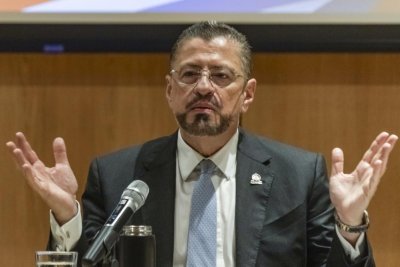Costa Rica’s President Rodrigo Chaves appears in a Legislative Assembly committee Friday in San Jose to present his arguments regarding criminal charges of alleged irregular handling of funds. Photo by Alexander Otarola/EPA
Aug. 25 (UPI) — A special congressional committee in Costa Rica is reviewing a request to lift President Rodrigo Chaves’ immunity, putting the executive branch and judiciary at odds.
Tensions between the two institutions escalated Friday after Chaves appeared before the committee, where he denied corruption charges and denounced the investigation by the National Prosecutor’s Office as a “setup” and a “judicial coup attempt.”
The more than four-hour session — broadcast live — marked an unprecedented moment: it was the first time a sitting president testified before lawmakers in a process to lift immunity.
Criticizing the judiciary’s role in the case brought by Attorney General Carlo Díaz, President Chaves told the committee the accusation had roots in the early days of his administration, when “I showed the people the responsibility of the judiciary and of legislative policy in the deep deterioration of our society.”
The case against President Chaves began after the Supreme Court asked Congress on July 1 to remove his immunity over an investigation tied to funds from the Central American Bank for Economic Integration. Prosecutors say Chaves intervened so that part of those funds — $32,000 — went to one of his advisers through a communications services contract.
The other side of the institutional clash came before and after the hearing. On Aug. 8, Attorney General Carlo Díaz told the same committee the case is backed by witness testimony and documents, evidence he said was sufficient to bring an indictment and request a trial.
Díaz said the case had gone through several internal reviews within the judiciary to ensure the accusation “is not seen as one branch attacking another.”
In a press release, Supreme Court President Orlando Aguirre Gómez rejected claims that the proceedings against the president amounted to a so-called “judicial coup.”
Aguirre defended the independence of the judiciary and the transparency with which the case has been handled. He stressed that every step in the process has followed the law and been carried out independently, without political pressure or private interests.
He also urged the public to be critical of rhetoric intended to mislead and reiterated that Costa Rica’s institutional strength rests on respect among branches of government and confidence in the justice system.
The special congressional committee also made its role clear: not to judge the merits of the case, but to decide whether there is sufficient basis to lift a sitting president’s immunity and bring him to trial.
